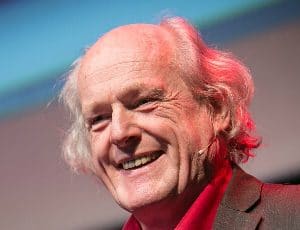Half an Hour,
Oct 25, 2019
The Electricity of Learning
Summary of a talk at eLearning Africa given by Jef Staes.
I'm going to tell a story of why education is failing. We have a design error.
1.
This is a battle of two groups of people. There was an information shortage. So industry started schools. But today everything has changed. But today we have an information glut. If we are passionate about something we can learn. This information flow changes the world from 2D flat to a world that is changing. 3D. Changing all the time. So we have the story of the 2D-Smarts and the 3D-Smarts. And there's a fight between them.
We have a legacy - me, old people - toward a legacy system. In this system, you don't get a degree because you followed your passion, you get a degree because you studied stuff you didn't want to study. Then you go to work, and you don't follow your passion, you do what your boss tells you to do. So the result is 80% of people are not engaged in what they do. They just go to work to earn money, to earn security, and gain a pension. And these people - 80% - are incompetent. And incompetence is driving us to the edge of existence, creating waste, creating smog, and people are dying.
Is we want to reinvent education, we have to focus on who we are.
2.
Children are the future. We have to re-engineer for the next generation. So we have to build systems that support passionate talents.
Why do some people learn really fast and some don't? Real learning only happens when you are in the groove with your talents. Everybody knows this, when you do what you are best at, you are better than everyone else. So we need to find out what we're good at, what we love.
Diversity is what we are made for.
So, how do we know our talents? One word: it's called 'passion'. It means 'suffering'. If people tell you they're passionate, you can see them suffering. A passionate teacher who is engaged, you can see them trying to create a better education. If you are passionate in love, you suffer.
But they don't want to suffer, they want to suffer less. The only way to do this is use information. They use information, suffer less, and do more. This is what makes you the best, and your system rewards you with dopamine.
Training programs don't instill passion.
"The two most important days of your life are the day you were born and the day you find out why." Mark Twain.
3.
I try to find out about what learning is. How do 3D smart learn?
Learning is a physical process. People who are passionate, who jump into the information flow, and online you get the fastest information, and the most people, and your brain lights up. And when people are passionate they want to share information. I don't know anyone who is passionate about a subject who refuses to answer a question - because when you answer a question you grow more.
So you should fire 30% of the teachers. Why? Because students who want to learn also want to teach. These become part of giving and taking.
(Demo of learning with a 3D brain that lights up. That happens when you learn, when you teach.)
Real teachers understand this. Real teachers create an environment that supports this.
4.
This has consequences.
I think we should create an environment where people with passions can accelerate. And where people who don't have the passion have the freedom to choose another course. If we don't have this, we don't have an educational system, we have a prison.
We have to invent learning technologies to make this happen.
The 'Power Defect'. It's about competence development. This has two meanings. The first is, you have to have people who are capable. But the second meaning is, you have to have the organization to do something with it. If you have the learning, but you can't do anything, you're not competent.
So we have four squares:
- not capable and not authorized = you're a machine (80% of people)
- capable and authorized = real competence.
- capable but not authorized = the power defect. This group is growing.
- not capable, but authorized = burnout/com - and this group is increasing also.
A lot of people my age have this huge responsibility, to hand over the authority. Because if we don't do this, there will be very bad consequences.




